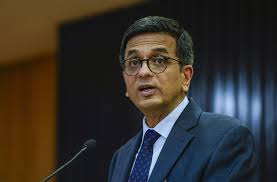CJI Chandrachud hails enactment of three new criminal laws, signifies India’s transition

Chief Justice of India (CJI) D Y Chandrachud praised the enactment of three new criminal laws in India, heralding it as a significant indication of the country’s evolution. The laws, namely Bharatiya Nyaya Sanhita, Bharatiya Nagarik Suraksha Sanhita, and Bharatiya Saksha Adhiniyam, are set to come into force from July 1 this year.
Speaking at a conference on ‘India’s Progressive Path in the Administration of Criminal Justice System’ in the national capital, CJI Chandrachud emphasized that the new laws represent a transformative shift in India’s legal framework, reflecting the changing dynamics of society. He underscored the importance of adapting to these laws for effective implementation, stressing the need for infrastructure development and capacity building among forensic experts, investigating officers, and the court system.
The new laws aim to replace the colonial-era Indian Penal Code, Criminal Procedure Code, and Indian Evidence Act, offering provisions synchronized with contemporary challenges. They address offenses related to terrorism, acts against the state, corruption in elections, and introduce electronic first information reports (FIRs) and electronic evidence as primary proof. Furthermore, detailed provisions and enhanced penalties are outlined for crimes against women, children, and cases like lynching.
While lauding the progressive aspects of the new legislation, CJI Chandrachud highlighted the need for immediate investments in infrastructure and capacity building to fully realize the benefits of these laws. He affirmed that the enactment of these laws signifies a watershed moment for Indian society, recognizing the pivotal role of criminal law in shaping societal conduct.
The CJI’s remarks underscore the transformative potential of the new criminal laws, marking a significant step towards a more effective and responsive criminal justice system in India.









